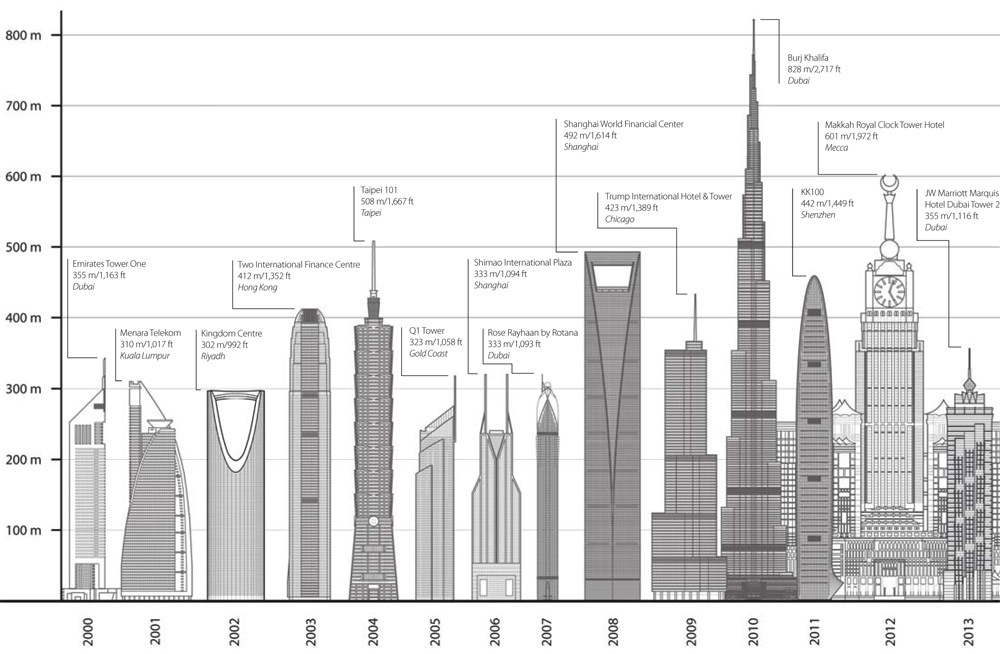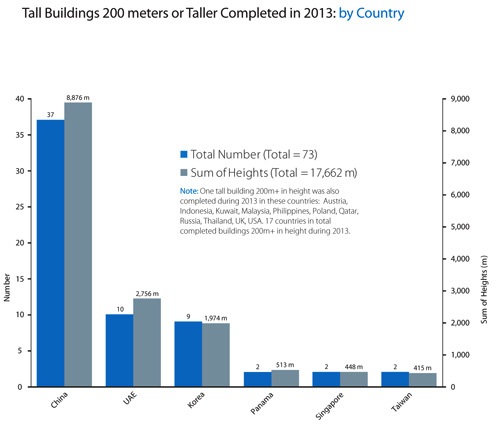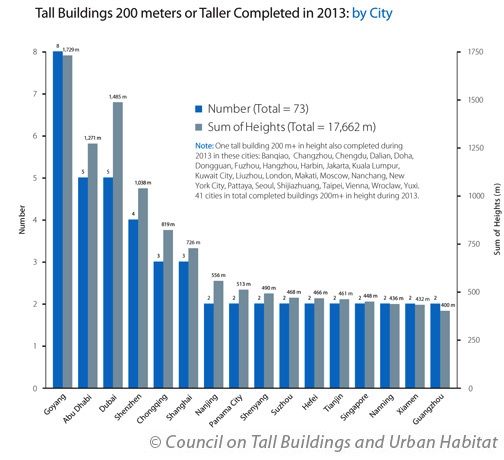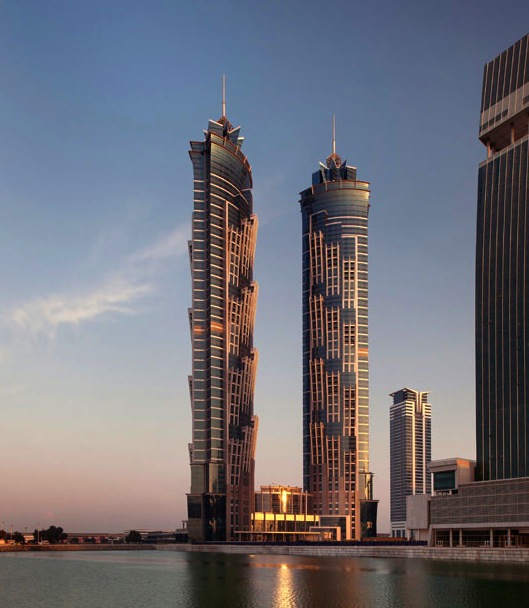While 2013 didn't see the completion of a mega tower like Burj Khalifa, it was a near-record-setting year in terms of the number of super-tall skyscrapers completed.
Led by the 82-story, 1,166-foot JW Marriott Marquis Hotel Dubai Tower 2, a total of 73 buildings of 200 meters or greater height were built in 2013. It was the second-busiest year ever, behind only 2011, when 81 super-tall projects opened, according to a report by the Council on Tall Buildings and Urban Habitat (CTBUH).
Last year also saw the completion of nine 300-meter-plus towers. In fact, nearly half (47%) the world's 77 300-meter-plus skyscrapers were completed during the past four years.
The top 10 skyscrapers completed in 2013 are:
1. JW Marriott Marquis Hotel Dubai Tower 2, Dubai, UAE (82 stories, 355 meters, 1,166 feet)
2. Mercury City Tower, Moscow, Russia (75, 339, 1,112)
3. Modern Media Center, Changzhou, China (57, 332, 1,089)
4. Al Yaqoub Tower, Dubai, UAE (69, 328, 1,076)
5. The Landmark, Abu Dhabi, UAE (72, 324, 1,063)
5. Deji Plaza, Nanjing, China (62, 324, 1,063)
7. Cayan Tower, Dubai, UAE (73, 307, 1,008)
8. East Pacific Center Tower A, Shenzhen, China (85, 306, 1,004)
8. The Shard, London, UK (73, 306, 1,004)
10. Dongguan TBA Tower Dongguan, China (68, 289, 948)
See the full list

Tall buildings 200 meters or taller completed each year from 1960 to 2014 © CTBUH (click image to enlarge)
Other milestones from 2013, according to the CTBUH report:
• Across the globe, the sum of heights of all 200-meter-plus buildings completed globally in 2013 was 17,662 meters – also the second-ranked in history, behind the 2011 record of 21,642 meters.
• Of the 73 buildings completed in 2013, 12 – or 16 percent – entered the list of 100 Tallest Buildings in the World.
• For the sixth year running, China had the most 200-meter-plus completions of any nation, at 37 – located across 22 cities.
• Three of the five tallest buildings completed are in the United Arab Emirates, for the second year in a row.
• The city of Goyang, Korea, has debuted on the world skyscraper stage with eight 200-meter-plus buildings completing in 2013.
• Europe has two of the 10 tallest buildings completed in a given year for the first time since 1953.
• Panama added two buildings over 200 meters, bringing the small Central American nation’s count up to 19. It had none as recently as 2008.
• Of the 73 buildings over 200 meters completed in 2013, only one, 1717 Broadway in New York, was in the U.S.
For the full report, visit: http://www.ctbuh.org/TallBuildings/HeightStatistics/AnnualBuildingReview/Trendsof2013/tabid/6105/language/en-US/Default.aspx

The tallest building completed each year since the year 2000. © CTBUH (click image to enlarge)

© CTBUH (click image to enlarge)

© CTBUH (click image to enlarge)
Related Stories
Architects | May 2, 2024
Emerging considerations in inclusive design
Design elements that consider a diverse population of users make lives better. When it comes to wayfinding, some factors will remain consistent—including accessibility and legibility.
K-12 Schools | Apr 30, 2024
Fully electric Oregon elementary school aims for resilience with microgrid design
The River Grove Elementary School in Oregon was designed for net-zero carbon and resiliency to seismic events, storms, and wildfire. The roughly 82,000-sf school in a Portland suburb will feature a microgrid—a small-scale power grid that operates independently from the area’s electric grid.
AEC Tech | Apr 30, 2024
Lack of organizational readiness is biggest hurdle to artificial intelligence adoption
Managers of companies in the industrial sector, including construction, have bought the hype of artificial intelligence (AI) as a transformative technology, but their organizations are not ready to realize its promise, according to research from IFS, a global cloud enterprise software company. An IFS survey of 1,700 senior decision-makers found that 84% of executives anticipate massive organizational benefits from AI.
Codes and Standards | Apr 30, 2024
Updated document details methods of testing fenestration for exterior walls
The Fenestration and Glazing Industry Alliance (FGIA) updated a document serving a recommended practice for determining test methodology for laboratory and field testing of exterior wall systems. The document pertains to products covered by an AAMA standard such as curtain walls, storefronts, window walls, and sloped glazing. AAMA 501-24, Methods of Test for Exterior Walls was last updated in 2015.
MFPRO+ News | Apr 29, 2024
World’s largest 3D printer could create entire neighborhoods
The University of Maine recently unveiled the world’s largest 3D printer said to be able to create entire neighborhoods. The machine is four times larger than a preceding model that was first tested in 2019. The older model was used to create a 600 sf single-family home made of recyclable wood fiber and bio-resin materials.
K-12 Schools | Apr 29, 2024
Tomorrow's classrooms: Designing schools for the digital age
In a world where technology’s rapid pace has reshaped how we live, work, and communicate, it should be no surprise that it’s also changing the PreK-12 education landscape.
Adaptive Reuse | Apr 29, 2024
6 characteristics of a successful adaptive reuse conversion
In the continuous battle against housing shortages and the surplus of vacant buildings, developers are turning their attention to the viability of adaptive reuse for their properties.
AEC Innovators | Apr 26, 2024
National Institute of Building Sciences announces Building Innovation 2024 schedule
The National Institute of Building Sciences is hosting its annual Building Innovation conference, May 22-24 at the Capital Hilton in Washington, D.C. BI2024 brings together everyone who impacts the built environment: government agencies, contractors, the private sector, architects, scientists, and more.
Mass Timber | Apr 25, 2024
Bjarke Ingels Group designs a mass timber cube structure for the University of Kansas
Bjarke Ingels Group (BIG) and executive architect BNIM have unveiled their design for a new mass timber cube structure called the Makers’ KUbe for the University of Kansas School of Architecture & Design. A six-story, 50,000-sf building for learning and collaboration, the light-filled KUbe will house studio and teaching space, 3D-printing and robotic labs, and a ground-level cafe, all organized around a central core.
Sports and Recreational Facilities | Apr 25, 2024
How pools can positively affect communities
Clark Nexsen senior architects Jennifer Heintz and Dorothea Schulz discuss how pools can create jobs, break down barriers, and create opportunities within communities.

















